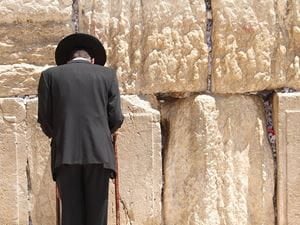
Tisha B'Av is a day that commemorates a day once a year where the Jewish people gather and fast over the many tragedies that took place against them. Tisha B'Av, means the Fast of the 9th, and this is observed in August.
What really is this day of remembrance? Tisha B'Av is a reflection on history, pain and learning to press through the most unbelievable assault on one group of people—the Jews. The holiday invites people to reflect on the destruction of the first and second Temples that were destroyed. The first was demolished by the Babylonians, and the second one was destroyed by the Romans. There was more hardship for the Jews by the Romans again in the Bar Kokhba Revolt. The Jewish people rebelled against the Roman Empire in Judea, and this lead to the devastation of Judean communities to the point of genocide. An estimated 580,000 Jews died during that time from the war or from starvation and sickness. Jews were also sent to slavery. Jews were ordered out of Spain and England before World War II. The Holocaust almost destroyed the Jews. The Holocaust killed 11 million people, including children, the disabled, and gays. Although many of the soldiers and servers of Adolf Hitler’s regime are dead or in the late stages of life, they are still being tracked down to pay for their heinous crimes against humanity.
Mourning these events is important so people don’t forget, and it can be a time of reflection and gratefulness. The Jews didn't have a place to call home for years, and the persecution never ended. No matter where they went, they had to fight to survive the prejudice, murder, threats, being outcasts, and living on the edge of society with no safety net. Finally, on May, 14th 1978 before the British Mandate, the head of the Jewish State, David Ben-Gurion declared Eretz-Israel, the official state of Israel. “We hereby proclaim the establishment of the Jewish state in Palestine, to be called Israel." Ben-Gurion also said that “Israel has created a new image of the Jew in the world - the image of a working and an intellectual people, of a people that can fight with heroism." This remains true today.
What does this have to do with mourning? Since the Jews endured such hardship, honoring Tisha B'Av makes sense for us to all slow down, respect those who suffered, and rejoice over past victories. However, how should we approach this 9th day in August? Should we be sad or be happy? This was a question Jewish World reporter Elon Gilad posed regarding the fasting on Tisha B'Av. “The need to express our most genuine selves manifests at times in pursuit of justice. This is reflected in social activism. Our collective need to give has been reflected in our caring and generosity. We are an extraordinarily interactive people, but we are still restless. The inner serenity that we seek eludes us--we are not quite at home,” the author contended. “The material world that fulfills us also distracts us from searching for our deepest sense of identity, and at time corrupts us. In recognition, other religions have idealized "rising above" worldly desire. Jews recognize the power and beauty of the world as a catalyst for our capacity to live meaningfully, and we embrace it. But our two worlds, the outer one and the inner one, sometimes remain separate realms. No one today can begin to understand the enormity of the loss of the Holy Temple in Jerusalem, the Beit HaMikdash. When it stood, the Temple let us experience spirituality directly. God's presence could be felt in every stone, in every corner--no external catalyst needed.”
We should fast and reflect, according to the Jewish Bible.
In Leviticus: “Then the one who burns them shall wash his clothes and bathe his body with water, and then afterward he shall come into the camp. This shall be a permanent statute for you: in the seventh month, on the 10th of the month, you shall humble your souls and not do any work, whether the native, or the alien who sojourns among you; for it is on this day that atonement shall be made for you to cleanse you; you will be clean from all your sins before the Lord.” Also the Lord instructed us to remember. He asked the Israelites as well. “And you shall remember the entire way on which the Lord, your God, led you these forty years in the desert, in order to afflict you to test you, to know what is in your heart, whether you would keep His commandments or not. And He afflicted you and let you go hungry, and then fed you with manna, which you did not know, nor did your forefathers know, so that He would make you know that man does not live by bread alone, but rather by, whatever comes forth from the mouth of the Lord does man live."Fasting and prayer should be done not only for a holiday, but as a way of life for everyone. It is a time to unplug, experience God, and celebrate blessings. This doesn't mean we are to forget tragedies like those outlined in the beginning of the article, but should be integrated into our daily lives. We can celebrate the good things that have come out of destruction, even if we really need to look hard. The Jewish people are more resilient than ever, because they had to be. Of course, fasting can be tailored to the individual. This doesn't just parley to fasting just food, it is ultimately a sacrifice all of us make to grow closer to God and to intercede on the behalf of others.

